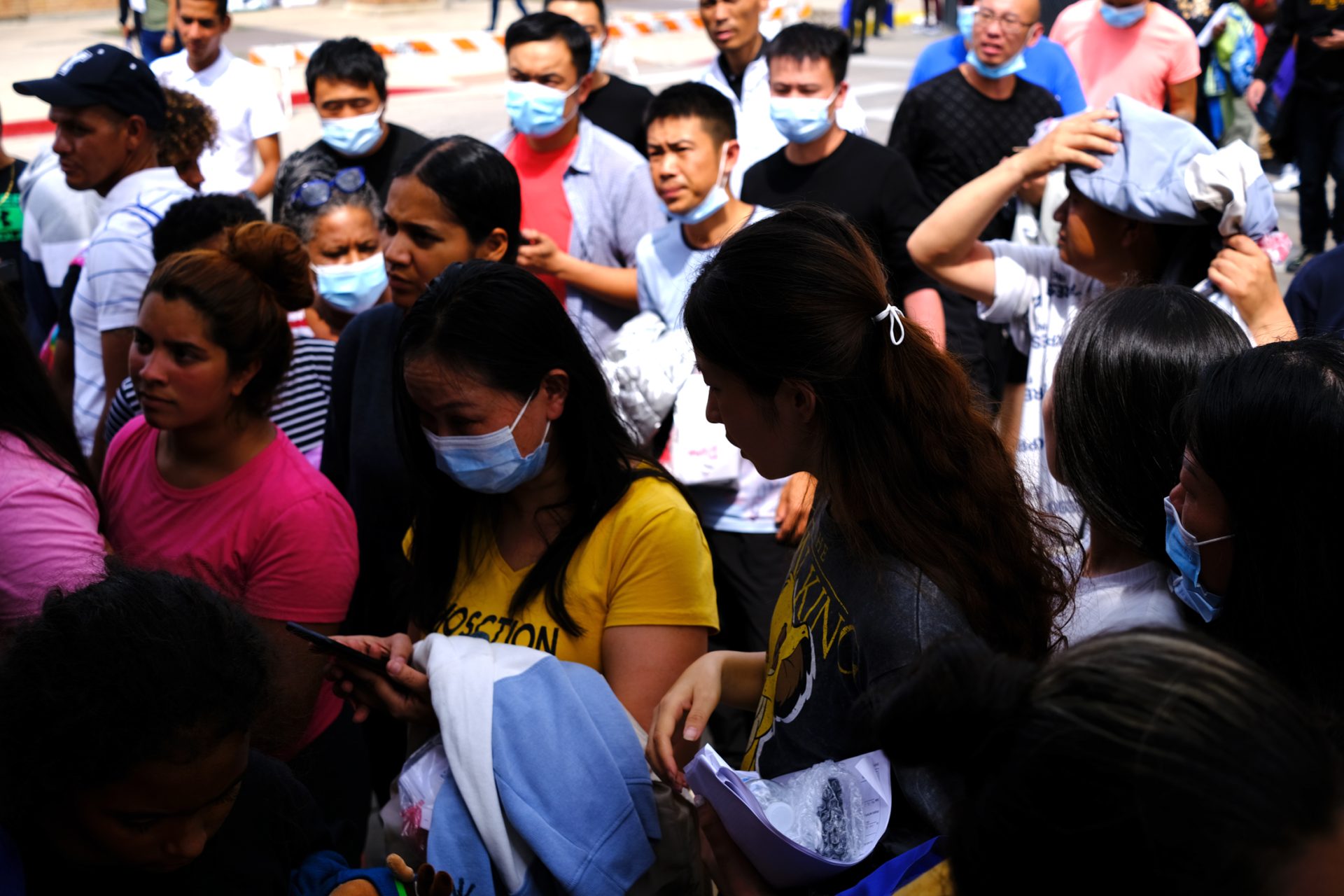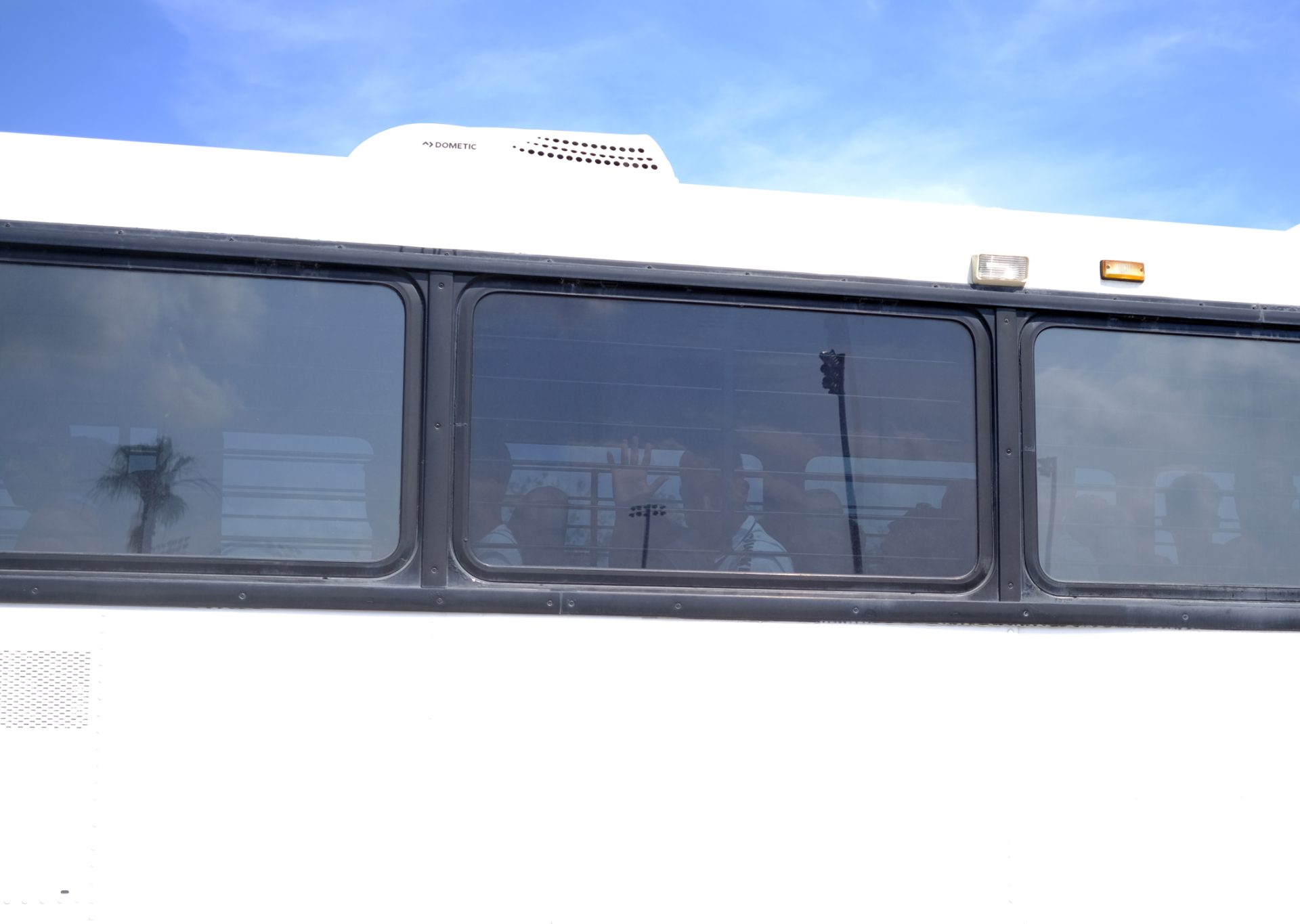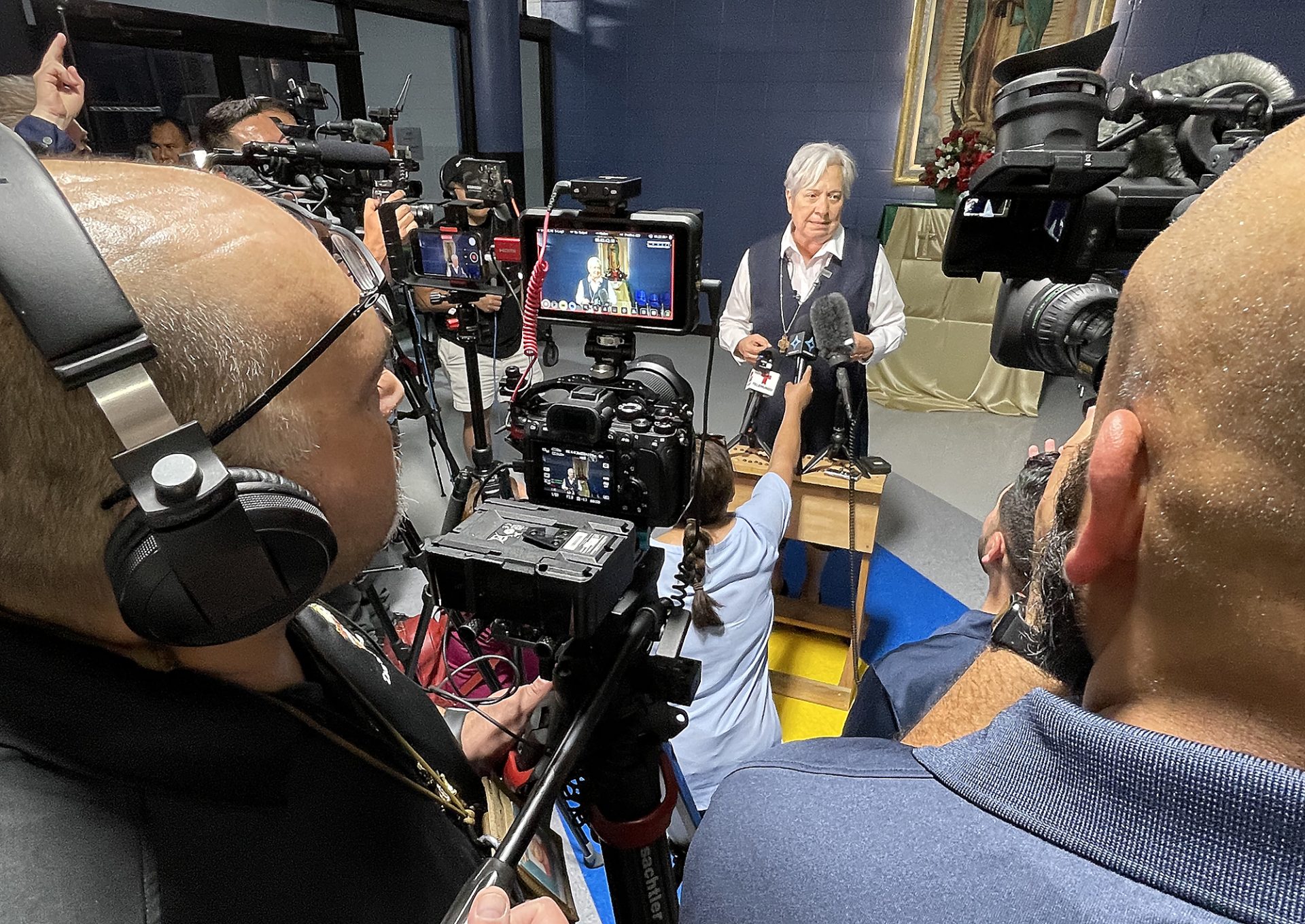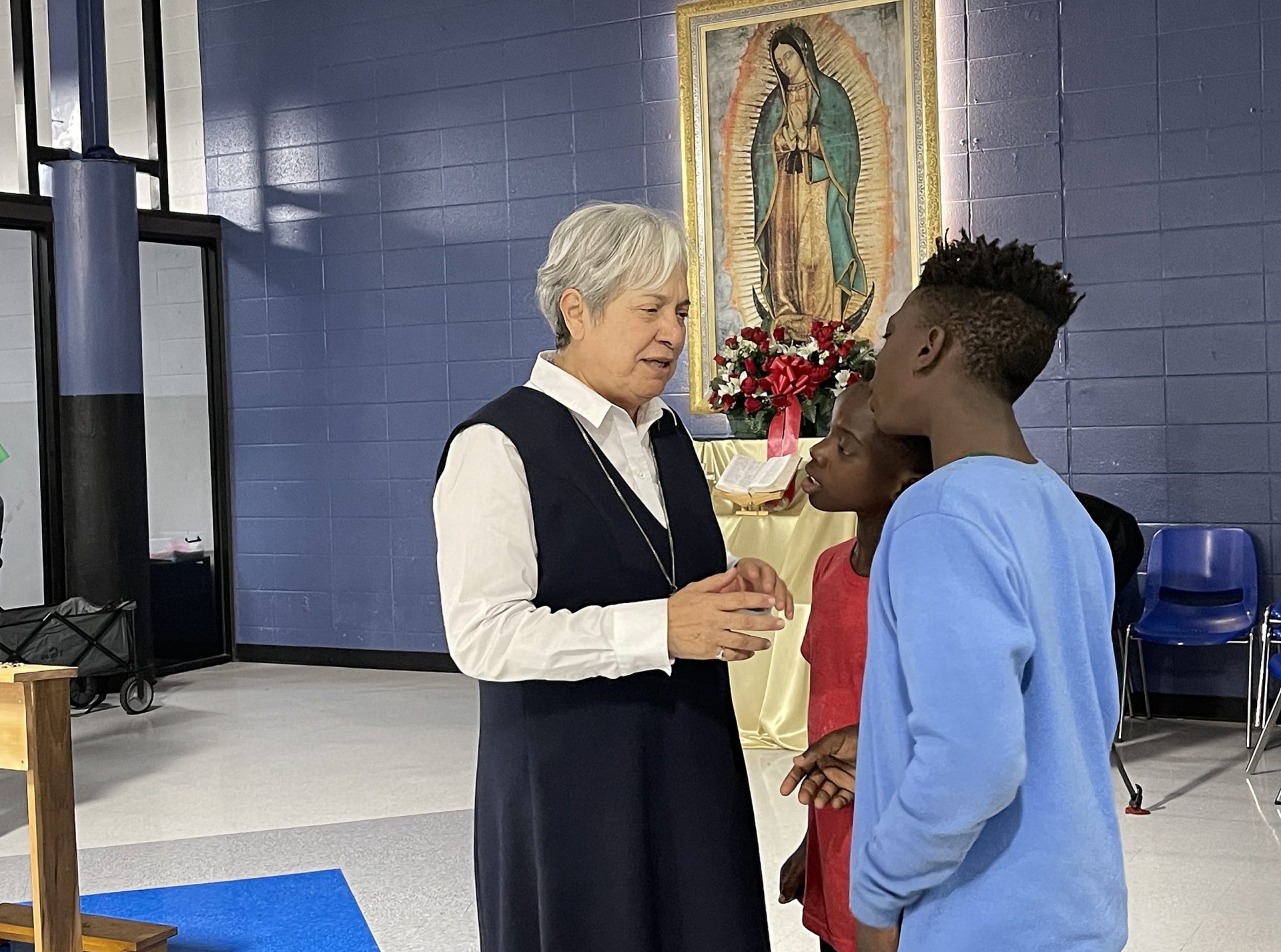|
Only have a minute? Listen instead
Getting your Trinity Audio player ready...
|
By STEVE CLARK and DINA ARÉVALO | STAFF WRITERS
Obviously, we’re preparing for the worst and hoping for the best. No one’s quite sure what to expect, but we wanted to be prepared as best we can in coordination.
On Thursday afternoon, several hours before the official end of Title 42 at 10:59 p.m. Central Standard Time, no one seemed to know quite what to expect with the policy’s end, this despite many predictions of a massive surge of migrants poised to overwhelm authorities at the Brownsville port-of-entry and other crossings along the U.S.-Mexico border.
U.S. Customs and Border Protection officers have been processing thousands of migrants, mostly from Venezuela, at a temporary staging area, dubbed “Camp Monument,” set up at the former Fort Brown Memorial Golf Course for rapid processing and transit of the migrants.
On May 2, local law enforcement agencies partnered with CBP and Border Patrol at Gateway International Bridge in Brownsville for an exercise simulating the emergency response to an attempt by large numbers of migrants to storm the bridge and enter into the United States illegally.
However, Cameron County Judge Eddie Trevino Jr. said late Thursday morning that he’d heard unconfirmed reports that the number of migrants waiting south of the Rio Grande opposite Brownsville had actually tapered off.
“We’re hearing that the numbers are way, way down this morning as far as people trying to cross,” he said.
Nonetheless, Trevino on Thursday signed a declaration of disaster for the county “in response to the imminent threat of widespread or severe damage, injury, or loss of life or property resulting from the Border Security Disaster,” according to the document.
“I’m not so sure that there’s going to be this dramatic change one way or the other, where you’re going to have a rush of people or it’s going to completely go down to a trickle,” Trevino said. “I don’t think it’s going to be like that, but maybe I’m wrong.”
He met with county law enforcement and local and elected leaders at Emergency Management and Fire Marshal Service headquarters on May 10 to “discuss, plan and prepare” in advance of the lifting of the Title 42 migrant-processing protocol, implemented by the Trump administration in March 2021 to make it easier to expel asylum seekers during the pandemic.

“Obviously, we’re preparing for the worst and hoping for the best,” Trevino said. “No one’s quite sure what to expect, but we wanted to be prepared as best we can in coordination.”
He said the city of Brownsville had done “an unbelievable job” helping migrants get to the next step by putting them on a bus, a plane or other means to their final destinations.
“And the (non-governmental organizations) have done an unbelievable job providing humanitarian assistance to the migrants,” Trevino said.
He noted that the end of Title 42 and return to normal Title 8 processing means a higher bar for migrants and asylum seekers — plus stiff penalties for those caught crossing illegally.
“If any individual tries to cross over in between the ports-of-entry, tries to cross illegally, they’ll be expelled immediately and banned for five years from returning,” Trevino said. “If they do it again, then they could be banned for life, and just as important, they’ll also potentially be (prosecuted).”
Also on Thursday, CBP Acting Commissioner Troy Miller issued a statement announcing the continuance of “parole processes for Venezuelans, Cubans, Haitians and Nicaraguans, which provide individuals with safe and orderly pathways to access the United States, and imposes consequences for those who do not use them.”
The parole processes depend on Mexico accepting tens of thousands of those foreign nationals entering the United States illegally after the lifting of Title 42.
“The Mexican government has reiterated its commitment to accepting 30,000 nationals from Venezuela, Cuba, Haiti and Nicaragua per month who have entered the United States unlawfully between the ports of entry once the Title 42 public health order lifts,” Miller said.

“Migrants who enter the United States unlawfully by crossing the Southwest Border, and not via a lawful pathway, will be returned to Mexico and may be transported away from Mexico’s northern border to locations in southern Mexico.
“As we have said many times, the border is not open to irregular migration. Individuals should not put their lives in the hand of smugglers, only to face steep consequences, including at least a five-year bar on reentry and potential criminal prosecution for repeated attempts to enter unlawfully, and be sent back.”
The city of Brownsville said that in anticipation of a surge it has set up a temporary migrant-transfer area in support of CBP’s need to transport migrants who arrive at Camp Monument safely and efficiently to reunite with family and/or a sponsor outside Brownsville.
A second temporary transfer area was established at the B-Metro/La Plaza Parking Garage downtown near Gateway International Bridge, supporting the transport of migrants in coordination with federal and state agencies, including “including privately owned transportation companies operating out of BMetro Transit,” according to the city.
“The city, while collaborating with commercial transportation services, is coordinating with private bus and airline operators to request increases to their frequency of services to expedite the transfer migrants.”
An online “dashboard” will be available at brownsvilletx.gov to track the number of migrant crossings at Brownsville’s three international bridges, according to the city.
Early Thursday evening, U.S. Sen. Ted Cruz was joined in Brownsville by other Republican lawmakers to continue his criticism of the Biden administration’s handling of immigration, and invoked the term “invasion” when speaking of the border apprehensions recorded this week.
“We are witnessing an absolute travesty unfolding on our southern border. On Monday, we apprehended over 10,000 people on the border, the highest level in history. On Tuesday, we apprehended over 10,000 people on the border, again the highest level in history,” Cruz said. “There are right now where we’re standing more than 22,000 people camped just south of the border getting ready to come across. Just in this location, in less than a month we’ve had over 35,000 Venezuelans cross illegally just right here, not counting the whole rest of the border. Every day, just right here, they’re encountering 90 to 100 Chinese nationals. Now for anyone who doesn’t have their globe nearby, China is not immediately to the south of the United States but 90-100 a day are crossing illegally on this border being smuggled in by Mexican drug cartels and I have to say I am angry, because this is deliberate.
“This was a decision that was made by President Joe Biden and Kamala Harris and congressional Democrats to open up the border to what is nothing less than an invasion.”
ON THE GROUND IN McALLEN
In McAllen, Sister Norma Pimentel, executive director of Catholic Charities of the Rio Grande Valley has already seen a substantial uptick in the number of migrants arriving at the Humanitarian Respite Center downtown.
“We have already started to see all this past week numbers increasing, people crossing already, and Border Patrol releasing higher numbers to us,” Pimentel announced to a gaggle of press just inside the center’s entrance Thursday.

The respite center was a bustle of noise and activity Thursday afternoon, less than 10 hours ahead of the expiration of Title 42.
Many of the migrants hail from Central American countries, like Honduras and Venezuela; however, smaller groups of migrants from as far away as Nigeria and China were also taking temporary shelter there Thursday.
Pimentel estimated that this week’s high number of crossings, which have occurred along the river throughout the Valley, but most notably in Brownsville, may be because of the uncertainty that Title 42’s expiry means.
“I think it is impacting in many ways because the policies that are being lifted up, it’s really difficult for the immigrants to know what to expect,” Pimentel said.
“Will they be allowed to remain in the United States or not? It’s so uncertain for them. And so that, in itself, is something that I don’t know,” she said.
As many as 8,000 to 10,000 migrants are just across the river in Reynosa, while 2,000 to 3,000 more are waiting in Matamoros, the nun said.
Those numbers are slightly lower than what officials expected to see, especially in comparison to 2019, which was the most recent migrant influx before COVID-19 sparked the implementation of Title 42.
Pimentel is scheduled to meet with Tamaulipas state officials on Friday to get a better idea of the situation in Mexico and to see what people like her can do to help.
But as for how many of those currently waiting in Mexico will try to enter the United States after Thursday, when border agents will resume enforcement of Title 8, which carries with it potential criminal consequences, remains the unanswerable question.
“Most of the people are (crossing) right now because they think that once Title 42 is lifted, they don’t have a chance to remain in the United States,” Pimentel said.
“So, they’re trying to enter before. That’s why we’re seeing such high numbers of people crossing between ports of entry.”

Meanwhile, on this side of the river, it’s already all hands on deck.
The respite center has the capacity to accommodate about 1,500 people — a number that can be expanded to as high as 2,000 by opening up space at local parish halls, Pimentel said.
And already, the city of McAllen has opened up its temporary holding facilities as Anzalduas Park.
“We opened Anzalduas today and Anzalduas is gonna take massive numbers of people that we’re gonna be able to receive and help there, as well,” Pimentel said.
The plight of the growing humanitarian needs here in the Rio Grande Valley has made it as far as The Vatican, where Pope Francis held an audience with Sister Norma last week.
“(The) Holy Father, who I was just visiting with just this past week, is very aware of what’s happening and very grateful that the Church and people are upfront helping the immigrants and being open to care for them,” Pimentel said.
And at the end of the day, it’s not the political bickering, the late night pundits, or the headlines that matter to Pimentel, but that humanitarian need.
“I focus on the humanitarian part. I care about the families and making sure they’re treated with dignity and respect…” she said.
“I hope that those folks that are actually immigrants that are here looking for protection and safety — asylum — that they get that chance,” she added a moment later.
Editor’s note: This story was updated to include remarks from Sen. Cruz.
To see more, view our full photo gallery here:
Photo Gallery: Valley prepares for potential surge of border crossings




